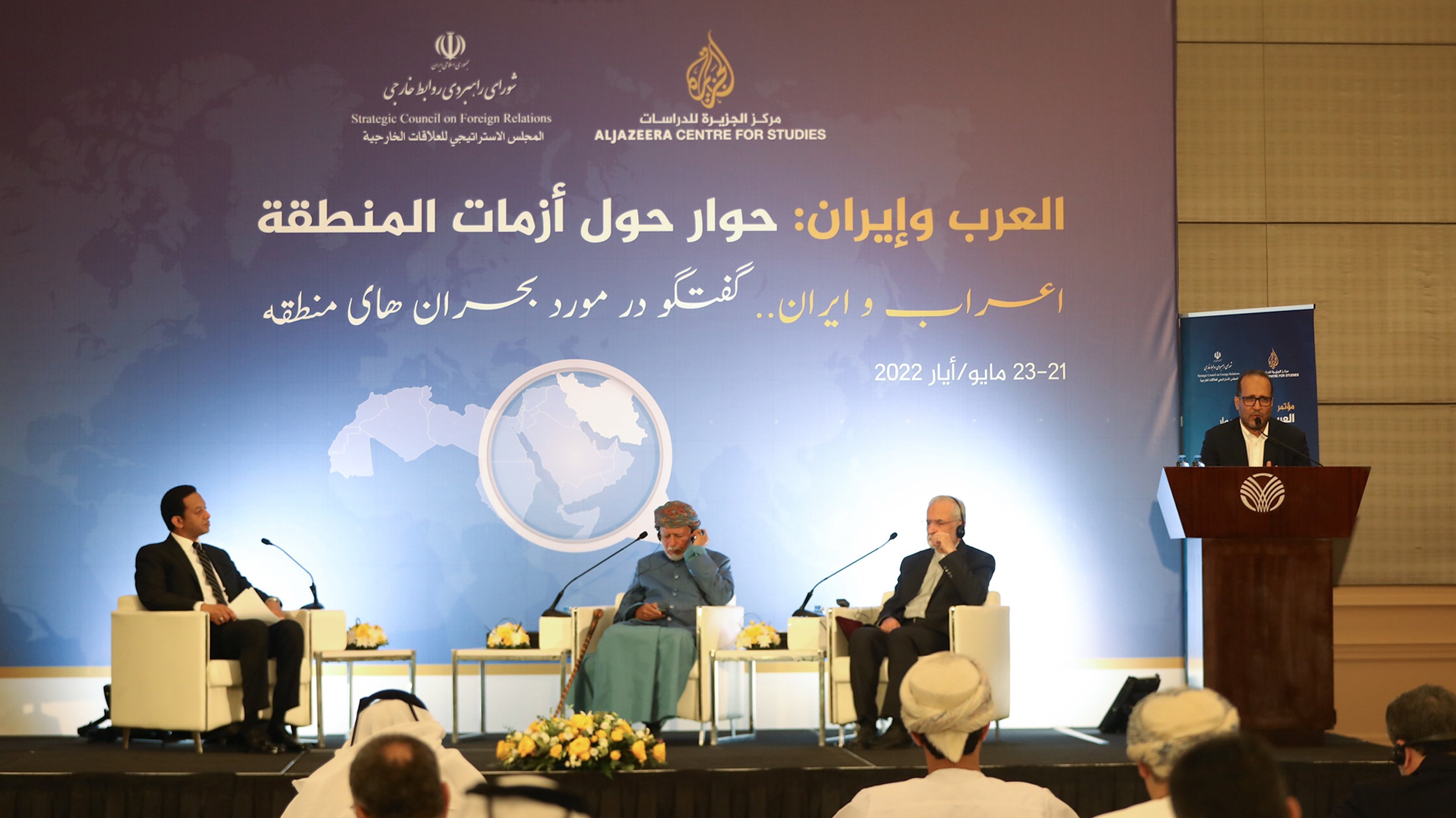
On Saturday, 21 May 2022, a conference organised by Al Jazeera Centre for Studies and the Council on Foreign Relations in the Islamic Republic of Iran under the title, “The Arabs and Iran: A Dialogue about the Region’s Crises” commenced in Doha with the participation of a select group of Iranian and Arab politicians, researchers and experts. It was also attended by Chairman of the Board of Directors of Al Jazeera Network, Sheikh Hamad bin Thamer Al Thani.
Dr. Mohammed Mukhtar Al Khalil, Director of Al Jazeera Centre for Studies, commenced the public session by discussing the importance of dialogue in bringing together different points of view pertaining to the means of resolving the problems and crises of the region, pointing to the commonalities between the countries of the region and the impact of Islamic civilisation on them. In addition, he asserted that the conditions of geopolitics make it imperative for neighbouring countries to adhere to dialogue as a way to solve problems and end crises.
On the role of Al Jazeera Centre for Studies in this conference, Al Khalil maintained, “The centre’s mission is limited to providing a platform for in-depth research and calm discussion on the region’s problems and crises, and seeking approaches to solutions that take into account the conditions of geopolitics and the complexities of common and conflicting interests.” He also added, “Politicians sow and the peoples reap what they plant; and to Al Jazeera Centre for Studies, it is an honour to organise a dialogue that benefits politicians and peoples alike.”
Afterwards, the Chair of the Strategic Council for Foreign Relations in the Islamic Republic of Iran and Former Minister of Foreign Affairs of Iran, Dr. Kamal Kharazi, and the Sultanate of Oman's Former Minister Responsible for Foreign Affairs, Dr. Yusuf bin Alawi bin Abdullah, made keynote speeches in which they presented their points of view of the nature of the crises facing the region and what dialogue between political and intellectual elites can achieve in terms of visions, perceptions and approaches that contribute to their resolutions.
In this regard, Dr. Yusuf bin Alawi indicated the importance of mutual interests as a basis for achieving any dialogue between states, alluding to confidence-building, mental perceptions, religious beliefs and cultural inventory in promoting and accelerating dialogue.
On the role of Oman in the Yemeni crisis and the efforts it exerts to bring together the points of view of the parties to the conflict, bin Alawi said, “The Yemenis are caught in their crisis and can no longer get out of it without the help of the international community represented by the United Nations, the United States, the European Union, Saudi Arabia, Iran and the Sultanate of Oman.” He also said that Yemeni-Yemeni dialogue, to which his country contributes, is ongoing but “moving slowly,” and that it is in everyone’s interest for it to pick up speed to reap its fruits in security, stability and development.
On his part, Dr. Kamal Kharazi explained that Iran was the gateway for Islam to spread in Central Asia, the Caucasus and the region surrounding them, that Islamic civilisation was and still is a source of pride for both Arabs and Iranians, and that Iran considers itself an extension of this civilisation. Thus, it is keen to maintain contact with its neighbours to achieve security and development.
Speaking of security and the importance of security, Kharazi maintained, “Security is not a commodity that can be bought but a fruit of mutual cooperation; and relations between the states of the region are a guarantee of security.” He also mentioned the role of foreign powers in destabilising the security of the region, saying, “History has proven that the presence of foreign powers in the region leads to the continuation of tensions and conflicts and does not achieve the anticipated security.”
On the role of dialogue in bringing together Iranian and Arab points of view, Kharazi affirmed that the misunderstanding resulting from crises and conflicts in the region cannot be resolved without dialogue, and emphasised that that “requires a change in the approach between the elites and the leaders of the region.” He also emphasised that this change would “achieve peace in the Strait of Hormuz, strengthen cooperation between the countries of the Persian Gulf, enhance reconciliation efforts, and push forward bilateral and multilateral relations.” In this regard, he said that his country attaches the utmost importance to improving relations with Saudi Arabia, as the latter has the Qiblah of Muslims and the Two Holy Mosques, and given the great role it plays. Hence, “the Islamic Republic of Iran’s view of the Kingdom of Saudi Arabia cannot be one of exclusion.” In this context, he referred to the five rounds of dialogue between Iran and Saudi Arabia, describing them as an "advanced step."
Next, Kharazi presented the Iranian position towards the crises in Yemen, Lebanon and Palestine. In this context, he stressed the centrality of the dimension that Iran’s foreign policy adopts in these crises, which is based, as he explained, on encouraging dialogue between the parties, bringing together points of view, enhancing common denominators, and overcoming the difficulties that hinder the achievement of peace, stability and development.
Moreover, Kharazi criticised the pursuits of certain Arab countries to normalise relations with the “Zionist entity,” and said that they come at a time in which this entity does not shy away from its violations, the most recent of which being the assassination of Al Jazeera correspondent Shireen Abu Akleh. He added that the Islamic Republic will not allow the "enemy nesting" in Jerusalem to continue its attacks.
Kharazi concluded his speech by praising the level of cooperation in Iranian-Qatari relations, culminated in the recent visit of the Emir of Qatar, Sheikh Tamim bin Hamad, to Tehran, and the resulting rapprochement in many issues of concern to the two countries and the region.